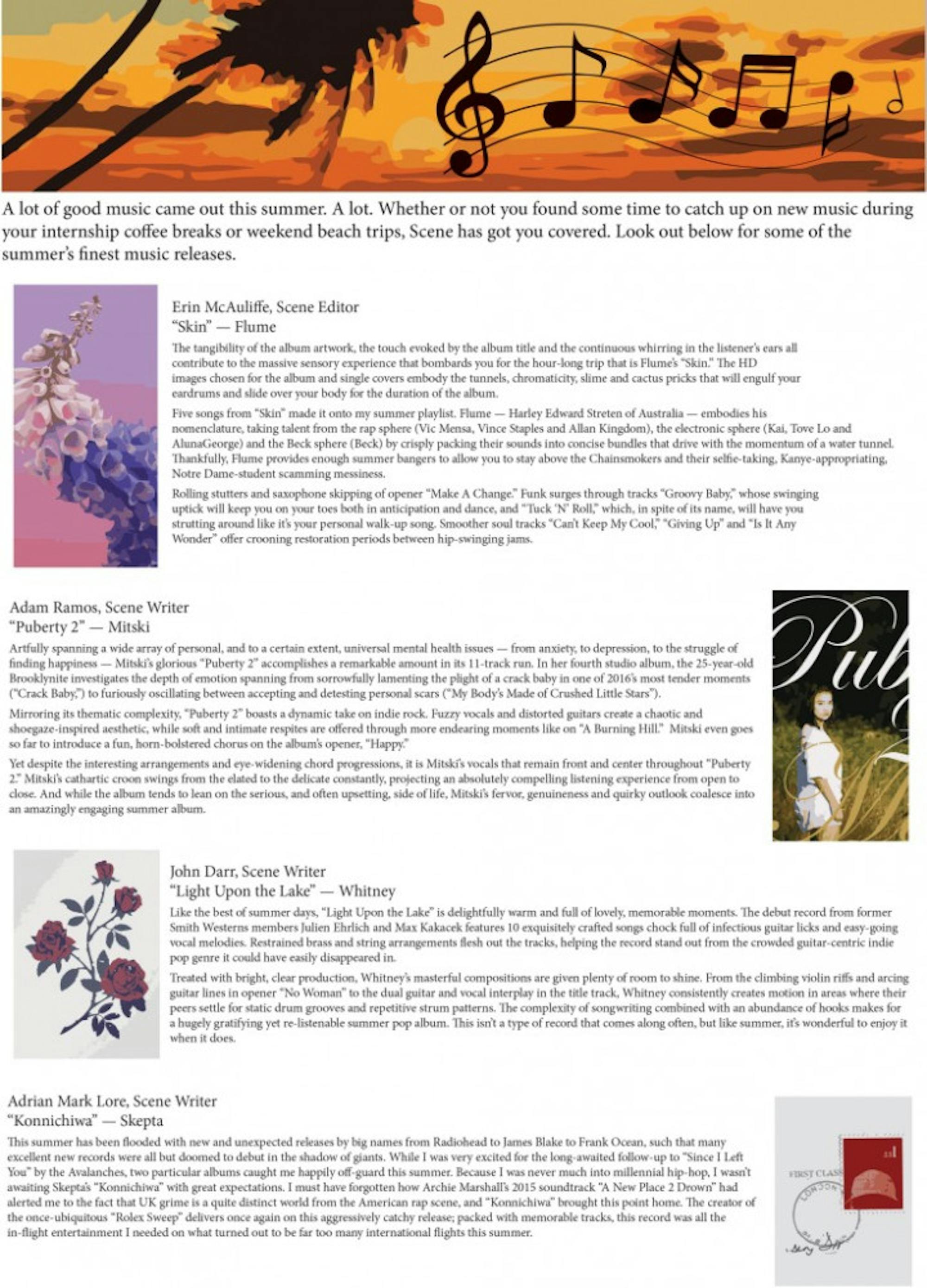A lot of good music came out this summer. A lot. Whether or not you found some time to catch up on new music during your internship coffee breaks or weekend beach trips, Scene has got you covered. Look out below for some of the summer’s finest music releases.
Erin McAuliffe
“Skin” — Flume
The tangibility of the album artwork, the touch evoked by the album title and the continuous whirring in the listener’s ears all contribute to the massive sensory experience that bombards you for the hour-long trip that is Flume’s “Skin.” The HD images chosen for the album and single covers embody the tunnels, chromaticity, slime and cactus pricks that will engulf your eardrums and slide over your body for the duration of the album.
Five songs from “Skin” made it onto my summer playlist. Flume —Harley Edward Streten of Australia — embodies his nomenclature, taking talent from the rap sphere (Vic Mensa, Vince Staples and Allan Kingdom), the electronic sphere (Kai, Tove Lo and AlunaGeorge) and the Beck sphere (Beck) by crisply packing their sounds into concise bundles that drive with the momentum of a water tunnel.
Thankfully, Flume provides enough summer bangers to allow you to stay above the Chainsmokers and their selfie-taking, Kanye-appropriating, Notre Dame-student scamming messiness.
“Durand Jones & The Indications” — Durand Jones & The Indications
This summer I had two jobs: an internship and chauffeuring my brother out to the suburban sprawls of Ohio. On one of those occasions I passed a record store — a glint of black vinyl happiness to break up the mundanity of carpools and radio. Inside the oasis I talked up college radio with the owners (the founders of Colemine Records) and was given some music to put on WVFI’s rotation.
Durand Jones & The Indications’ debut self-titled album was one of those records. Spinning the transparent blue vinyl I was immediately entranced by the rolling stutters and saxophone skipping of opener “Make A Change.” Funk surges through tracks “Groovy Baby,” whose swinging uptick will keep you on your toes both in anticipation and dance, and “Tuck ‘N’ Roll,” which, in spite of its name, will have you strutting around like it’s your personal walk-up song. Smoother soul tracks “Can’t Keep My Cool,” “Giving Up” and “Is It Any Wonder” offer crooning restoration periods between hip-swinging jams.
Durand Jones has the wail of Alabama Shakes’ Brittany Howard, the nostalgic toe-popping vibes of Leon Bridges and a record to compete with both.
Adam Ramos
“Puberty 2” — Mitski
Artfully spanning a wide array of personal, and to a certain extent, universal mental health issues — from anxiety, to depression, to the struggle of finding happiness — Mitski’s glorious “Puberty 2” accomplishes a remarkable amount in its 11 track run. In her fourth studio album, the 25-year-old Brooklynite investigates the depth of emotion spanning from sorrowfully lamenting the plight of a crack baby in one of 2016’s most tender moments (“Crack Baby,”) to furiously oscillating between accepting and detesting personal scars (“My Body’s Made of Crushed Little Stars.”)
Mirroring its thematic complexity, “Puberty 2” boasts a dynamic take on indie rock. Fuzzy vocals and distorted guitars create a chaotic and shoegaze-inspired aesthetic, while soft and intimate respites are offered through more endearing moments like on “A Burning Hill.” Mitski even goes so far to introduce a fun, horn-bolstered chorus on the album’s opener, “Happy.”
Yet despite the interesting arrangements and eye-widening chord progressions, it is Mitski’s vocals that remain front and center throughout “Puberty 2.” Mitski’s cathartic croon swings from the elated to the delicate constantly, projecting an absolutely compelling listening experience from open to close. And while the album tends to lean on the serious, and often upsetting, side of life, Mitski’s fervor, genuineness, and quirky outlook coalesce into an amazingly engaging summer album.
Kelly McGarry
“The Getaway” — Red Hot Chili Peppers
The Red Hot Chili Peppers’ sound is so distinctive that they can’t be compared to anyone but themselves. On my most-anticipated summer album “The Getaway,” the Chilis make a comeback from the catchy but underwhelming content of previous record “I’m With You.” Driven by Flea’s bass lines and Kiedis’ smooth, intricate vocals, the new album is not a redefinition. The funky intro from clear standout track “Go Robot” invokes the previous album’s “Factory of Faith” with eerie similarity.
Yet “The Getaway” brings a level of maturity that was lacking on previous albums. The hyper-sexuality, particularly evident on 1991’s “Blood Sugar Sex Magik,” no longer befits the band members in their 50s. This relatively newfound maturity is obvious in track “The Hunter,” ironically driven by the guitar of youngest member Josh Klinghoffer.
The influence of Elton John, another of my most-played artists, is evident in the smooth sophistication of track “Sick Love.” A nearly too-frantic guitar performance on "Dreams of the Samurai" is offset by dreamy piano and vocal melodies. The track is a metal finale that drives home the point that, though not redefined, the Chilis are still moving forward.
John Darr
"Light Upon the Lake" — Whitney
Like the best of summer days, “Light Upon the Lake” is delightfully warm and full of lovely, memorable moments. The debut record from former Smith Westerns members Julien Ehrlich and Max Kakacek features 10 exquisitely crafted songs chock full of infectious guitar licks and easy-going vocal melodies. Restrained brass and string arrangements help flesh out the tracks, helping the record stand out from the crowded guitar-centric indie pop genre it could have easily disappeared in.
Treated with bright, clear production, Whitney’s masterful compositions are given plenty of room to shine. From the climbing violin riffs and arcing guitar lines in opener “No Woman” to the dual guitar and vocal interplay in the title track, Whitney consistently creates motion in areas where their peers settle for static drum grooves and repetitive strum patterns. The complexity of songwriting combined with an abundance of hooks makes for a hugely gratifying yet re-listenable summer pop album. This isn’t a type of record that comes along often, but like summer, it’s wonderful to enjoy it when it does.
Jimmy Kemper
“Still Brazy” — YG
YG’s follow-up to 2014’s critical and commercial hit “My Krazy Life” stands out among the hip-hop albums of this summer because of its authenticity and importance. YG, a historically great storyteller, employs his narrative skills to detail the Brazy landscape of his past few years, including the birth of his daughter and the details of getting shot outside his L.A. studio. Tying this very real, very specific and very horrific incident to the greater narrative of a post-Trump America gives “Still Brazy” a sense of thematic urgency concerning the violent nature of our modern political era.
On top of all this, the album straight up bumps. In the face of fallout with longtime collaborator DJ Mustard, YG has had the opportunity to explore his vision as an artist and bring in a new team of producers to give his masterpiece some color, including Hit-Boy, Ty Dolla $ign and Swish. The result: one of the most tightly produced albums of this year, a digestible delivery platform for a crucial political message and a classic, OG, G-Funk banger.
Adrian Mark Lore
“Konnichiwa” — Skepta
This summer has been flooded with new and unexpected releases by big names from Radiohead to James Blake to Frank Ocean, such that many excellent new records were all but doomed to debut in the shadow of giants. While I was very excited for the long-awaited follow-up to “Since I Left You” by the Avalanches, two particular albums caught me happily off-guard this summer. Because I was never much into millennial hip-hop, I wasn’t awaiting Skepta’s “Konnichiwa” with great expectations. I must have forgotten how Archie Marshall’s 2015 soundtrack “A New Place 2 Drown” had alerted me to the fact that UK grime is a quite distinct world from the American rap scene, and“Konnichiwa” brought this point home. The creator of the once-ubiquitous “Rolex Sweep” delivers once again on this aggressively catchy release; packed with memorable tracks, this record was all the in-flight entertainment I needed on what turned out to be far too many international flights this summer.
“Love if Possible” — Shintaro Sakamoto
Japanese folk rock mainstay Shintaro Sakamoto’s third solo LP, “Love if Possible,” was a late-summer treat. The jams on this album are more hard-boiled than on his previous releases, a welcome new approach to his songwriting. The grooves that made his earlier releases great summer albums — it must be no coincidence that each has been released in or around August — are still around, of course. But now, Sakamoto’s songs progress more slowly, more calmly, like the perfect soundtrack to a lethargic late-afternoon dip in a pool warmed awkwardly by the sun, bloated on lemonade. The title track is an essential for a fan of the genre.
Nora McGreevy
“True Sadness” — The Avett Brothers
Predictably, “True Sadness” made me feel — well, sad. But it also made me feel joyful, unexpectedly so. “True Sadness,” the Avett Brother’s ninth studio album, marks a stylistic departure from the band’s typically raw, bluegrass style, toward a more polished but nonetheless enjoyable blend of rock, Americana and alternative elements. “Ain’t No Man,” the first track on the album, is imbued with the same infectious beat as older popular anthems such as “Kick Drum Heart,” but it trades out banjos for synthesizers and bass. If you’re looking for the old 2009-era Avett Brothers, you’ll find them in songs like “No Hard Feelings” (think “I and Love and You,” but softer). If you’re looking to be surprised, listen to “Divorce Separation Blues” (I won’t spoil it too much, but know that it involves yodeling).
The prevailing theme throughout the album is juxtaposition in both the music and the themes. Sad lyrics pair with brazenly excited guitar solos in “Satan Pulls the Strings.” Classic banjo-plucking melodies are followed up by lush, symphonic movements in “May it Last.” The lyrics speak of drug addiction, alcoholism, divorce and death, yet also manage to fit in the role of friendship in overcoming grief and the importance of optimism. “True Sadness” refuses to take itself — or its subject matter — too seriously, bringing light to an otherwise dark subject.













